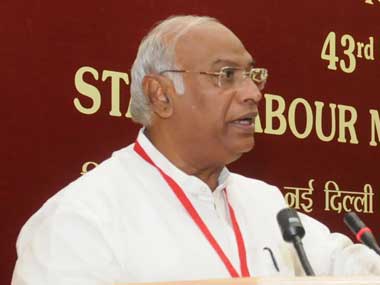The good news about the Railway Budget speech of Mallikarjun Kharge was that it was cut short by the anti-Telangana shouting brigade in the Lok Sabha. The net result is that we were spared a long-winded election-eve interim budget speeches that railway ministers are prone to give. While Kharge was not expected to raise passenger fares (politically unthinkable anyway) or freight (given the state of the economy), the numbers contained some good news nevertheless. The key cause for some cheer is that 2013-14’s freight loading target of 1,047 million tonnes will be marginally exceeded, and is now estimated at 1,052 million tonnes. The not-so-good news is that for next year, there is a modest 4.6 percent hike proposed to 1,101 million tonnes. If rail traffic will grow only 4.6 percent next year, it means either the new government will have hiked fares or the economy is going to grow slowly. [caption id=“attachment_1385941” align=“alignleft” width=“380”]  The only big change that Bansal made in last year’s railway budget was a shift to automatic increases in freight charges based on fuel prices.. PTI[/caption] But then, an interim budget is an interim budget, and the estimates and forecasts, having come a fortnight before they were normally due, making them less robust. Numbers tend to be clearer the closer we come to the end of the year. But there are serious causes for worry too. The numbers for 2013-14 and the next year show that inflation is eating the railway cake, and damaging its ability to invest. Despite a 12 percent increase in gross traffic receipts to Rs 1,61,000 crore in 2014-15, the annual plan is up only a meagre 1.4 percent over what was estimated last year (Rs 63,363 crore). Clearly the bulk of the increase is going to be swallowed up by increased running costs and there is no fresh investment. The annual plan, however, shows an increase of 8 percent over the revised plan outlay of 2013-14 at Rs 59,359 crore – which is still below inflation. This means the railways are eating up more of their revenues rather than investing in rolling stock and rail infrastructure. Not only that, the rail budget expects an increased level of support from the general budget at Rs 30,200 crore – up 16 percent from Rs 26,000 mentioned in the last budget. This means the railways are increasing their dependence on handouts rather than traffic and passenger earnings. While ordinary working expenses are up 12 percent to Rs 1,10,649 crore, total working expenses are up faster by 13.3 percent to 1,44,199 crore. The reasons, the ministry explains, are “additional requirements on account of fresh recruitment, increase in dearness allowance rates, increase in fuel bill, higher lease charges payable to IRFC and general inflationary increases.” Last year, when the railway ministry returned to the Congress fold after a gap of 17 years (following the exit of Trinamool Congress from UPA), great things were expected in terms of reforms. But the Congress’s first railway minister, Pawan Bansal, was ousted when he got trapped in a bribes-for-jobs controversy. Last year, before his exit, Bansal seems to have wangled a lower dividend payout obligation from the finance minister. The railways now have to pay only 4 percent dividend to the general exchequer, down 1 percent from the earlier figure, and lower than the minimum earlier requirement of 6 percent. The railways are clearly becoming less and less of a commercial organisation, despite the change in freight and fares in 2012-13 and last year. The only big change that Bansal made in last year’s railway budget was a shift to automatic increases in freight charges based on fuel prices. But even here, he pulled his punches, by temporarily leaving passenger fares out of the fuel adjustment charge (FAC). That, presumably, will happen only after the next general elections. The freight is probably getting adjusted with the fuel adjustment charge – but largely unannounced.
The good news about the Railway Budget speech of Mallikarjun Kharge was that it was cut short by the anti-Telangana shouting brigade in the Lok Sabha. The net result is that we were spared a long-winded election-eve interim budget speeches that railway ministers are prone to give.
Advertisement
End of Article
Written by R Jagannathan
R Jagannathan is the Editor-in-Chief of Firstpost. see more


)

)
)
)
)
)
)
)
)



